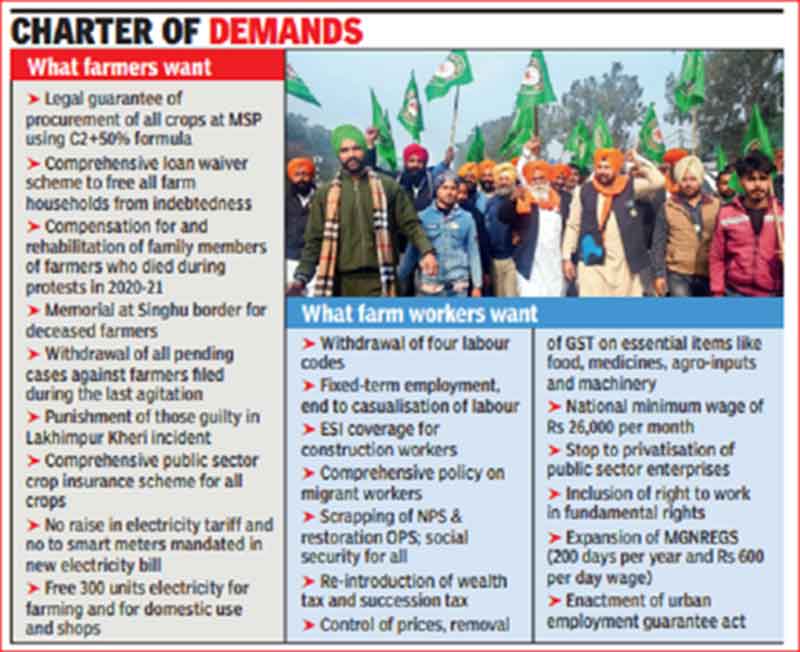
Farmer protests throughout the country have now been going on for quite a while without any ending in the sight. These protests came into force when government introduced 3 new farm bills: Farmers (Empowerment and Protection) Agreement of Price Assurance and Farm Services; Farmers Produce Trade and Commerce (Promotion and Facilitation) Bill; and Essential Commodities (Amendment) Bill.
Government’s rationale behind the three bills is to allow more independence to the farmers on where they want to sell their produce which can increase the prices commanded by farmers for their crops. Also, increased private participation can improve accessibility to new technologies further improving productivity. However, farmers are highly apprehensive of the motive behind the bills which we will look in detail in the subsequent paragraphs.
Let us look in details on why Indian agriculture needs reform, role of newly introduced agriculture bills and why they are being heavily criticized specially by the farmers from Punjab.
Indian agriculture is plagued by two key problems: fragmented land holdings and lack of mechanization leading to extremely low productivity. Nobody doubts that for India to exit its lower middle income trap, farming needs to improve than its current sub 3% growth rut. Productivity of land, labor etc. have to improve which can only be done by increased private investments, especially in processing and storage for export increase. Literature has suggested two strategic choices: private markets or private organizations. However, the current government is leaning towards the market approach which is being viewed by farmers as an end to institutional state support, allowing profiteering corporations to exploit the farmers.
Another area where the law has been criticized is lack of consultation by the government and the rushed manner in which it was passed in the Parliament. Even defenders of these programs seems to have expressed their discontent with lack of clear communication around benefits and intent of the farm bills.
Let us now look at how each of the individual bill affects farmers. The Essential Commodities Act has now removed foodstuff such as cereals, pulses, potato, onions, oils from the list of essential commodities except in the case of famine. Moreover, new Amendment restricts government from preventing supermarkets from hoarding which can have dire consequences for crop prices. The negative effect of this price increase gets amplified for weaker sections of the society which rely on staple crops such as potato and pulses to feed their large families.
New Farmers Produce Trade and Commerce bill has now allowed farmers to sell their produce directly to institutional buyers across states. While this can help ensure access to much needed private capital for Indian agriculture system, farmers group are worried of exploitation by large corporates who will have more bargaining power especially over small and marginal farmers. While the current APMC markets ensure minimum support price (MSP) for farmers, experts are worried that if farmers are to conduct trade outside of the AMPC marketplace, they might not even get the MSP which is already significantly lower for the farmers. More pricing power with corporates can lead to distress sale by farmers and can lead into a vicious cycle for Indian agriculture. The third law, Contract Farming Law, empowers farmers to enter into written contracts with anyone including institutional buyers. While government has emphasized the importance of written contracts in protecting the interest of the parties, they have failed to realize that 82% of the farmers in India are marginal and they do not have the legal mechanism to be able to go to court against a supermarket chain. There is no mechanism of fixing a price or protection that farmers can avail in case of exploitation. Based on our discussion with one of a notable farmers and rural workers rights activist from Andhra Pradesh, what is more concerning in this law is there is no redressal mechanism available via courts for farmers in case of contact breaches. Moreover, lack of vigilance on the private players incentivizes them to create dubious contracts. Allowing corporates direct access to the market without regulated purchase mechanism can have dire consequences for the small and marginal farmer.
Another impact of these farm bills will be on the revenue of state governments specially Punjab and Haryana which are highly reliant on agricultural economy however this might encourage government to stimulate economic development in other areas such as manufacturing. Government should also learn from its previous mistakes. For instance, in Bihar, farmers were promised that APMCs would be repealed with entry of private players who will create new infrastructure. However, till date corporate sector has not invested a single amount in the agriculture sector in Bihar with farmers getting much lower price than MSP. Hence expectedly farmers are wary of those experiences and exhibit high degree of trust within the current MSP system followed by each state government.
Government should now immediately focus on diffusing the tension with farmers. First and foremost step should be to engage in detailed discussion with farmer bodies explaining them the clear pros of the move as well as incorporate constructive recommendations from the farmer bodies. Capital inflows via privatization need to be done gradually creating grievances redressal mechanism for the farmers which can provide fast track resolution. In addition to this, government should also incentivize participation of agritech startups which have already been successful in building connections with the farmer communities and have helped solve complex problems such as direct market access for farmers, IoT based analytics etc. Instead of market supremacy, a combination of institutional and market policies need to be created to reform Indian agricultural space.
Letting the unrest linger without any resolution can lead to chaos in the food market and derail India’s post Covid recovery and hence warrants timely resolution by the government.
Akanshu Verma Indian Institute of Management, Ahmedabad
SIGN UP FOR COUNTERCURRENTS DAILY NEWSLETTER















































